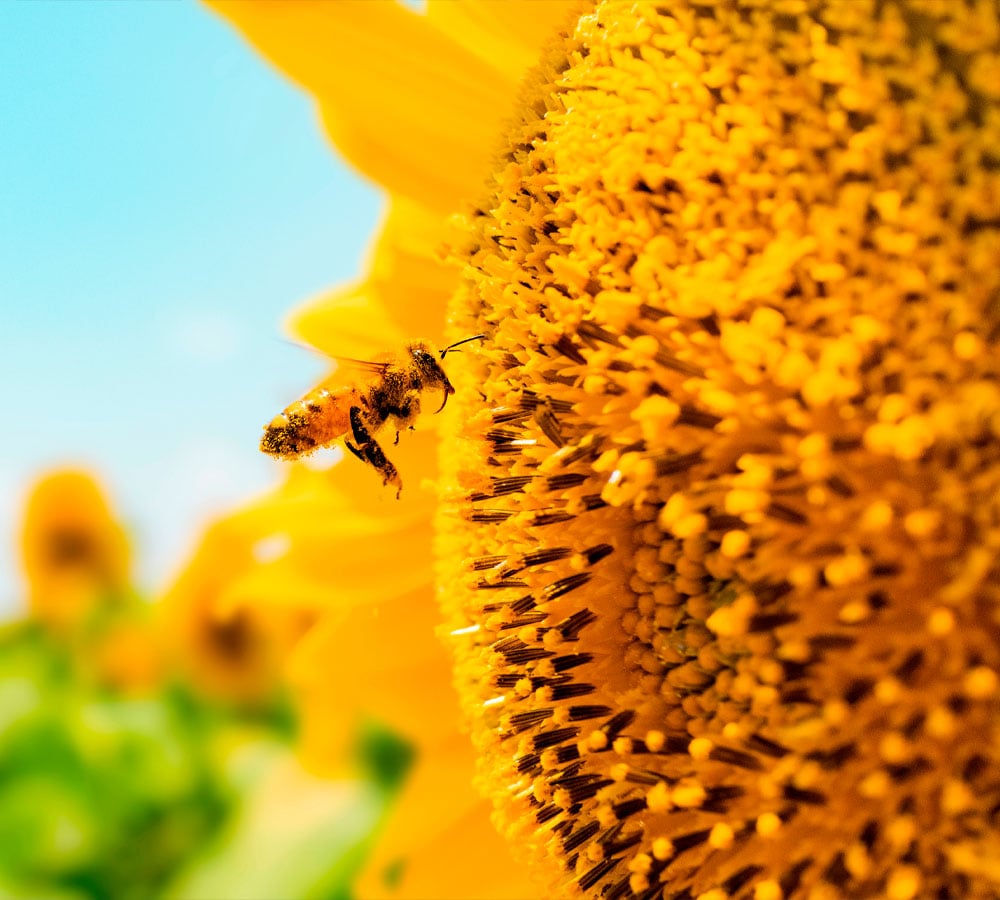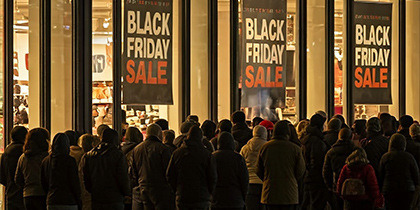Black Friday originated in the United States and has evolved into a worldwide bargain phenomenon. Stores stunt high discounts, causing consumers to purchase new products in large numbers. Despite the appeal of these discounts, they also bring environmental impact. In this blog, you can read about what waste impact this is and how we can reduce it.
The bargain phenomenon as an impact on the chain
''50% off almost everything!'' - these types of offers create increased demand for products during Black Friday. This not only impacts logistics, but also contributes to amount of packaging waste, returns and overproduction. This works as follows:
Logistics
Although many companies are prepared for this peak, the pressure to deliver products quickly to consumers often causes an increase in the use of less sustainable transportation methods, such as air freight. Despite only a portion of all shipments being made by air, this form of transport generates an average of 40% more CO2 emissions than transport by sea.
Packaging
In order to protect packages during transport, sturdy packaging is important. Packages often go through different means of transportation, such as trucks, ships and planes. During Black Friday, the quality of packaging becomes even more important due to the high rush and speed at which packages are processed and shipped. The risk of damage during transport increases, so products are often packed more tightly or thickly during this peak period. However, much of this packaging is discarded after use. This is partly because they are made of mixed materials, such as plastic and cardboard, which makes reuse or recycling more difficult.
Return shipments
With the surge in online purchases and the rise of popular Chinese online shops, postal services are preparing for high volumes of orders and returns. PostNL has announced it will deploy 1,500 extra delivery rides and 300 extra trucks daily starting Nov. 25 to deliver all packages on time. This leads to additional CO2 emissions and packaging materials. Many consumers order multiple sizes or variants with the intention of returning a portion. This not only requires additional emissions, but also contributes to waste by using additional packaging material.
Overproduction
To avoid inventory shortages during Black Friday, companies often choose to provide more inventory. This can lead to excess inventory going unsold, especially for products with a short lifespan or rapidly changing trends, such as in the fast-fashion industry. In the Netherlands, the amount of discarded clothing has doubled in the past 25 years, from 8 to 15 kilograms per person per year.
This waste is exacerbated, among other things, by planned obsolescence, where products are deliberately designed to wear out or age faster. Consider smartphones that slow down after a few years or garments that wear out quickly due to low quality. During Black Friday, this plays a bigger role, as low prices and temporary discounts lead to impulse purchases. Many unsold products and returns end up directly in the trash, as inspection and resale are often more expensive than destruction.
What can you do as a business to reduce the impact of Black Friday?
Reduce waste
To reduce waste, companies can invest in more sustainable production processes. Conducting a Life Cycle Analysis (LCA) can be a valuable step in this regard to gain insight into the impact of the production process and make targeted improvements. This gives you insight into the full environmental impact of their products, from raw materials to end-of-life. For example, companies discover which parts or materials cause the greatest impact and can make targeted improvements accordingly, such as more efficient use of raw materials or more sustainable product designs.
In addition, transparency about the quality of products and offering alternatives, such as repair services or second-hand options, helps reduce waste. By making products last longer and encouraging customers to make more conscious choices, companies can reduce both waste and unnecessary overproduction. This not only offers environmental benefits, but can also save costs and contribute to a more positive corporate image. More and more consumers are consciously choosing companies that value sustainability, which can provide a competitive advantage.
Conserving packaging material
As mentioned earlier, Black Friday causes an increase in packaging consumption. On reducing the environmental impact of this, companies can use reusable packaging. Instead of single-use packaging, which is often discarded after one use, reusable alternatives can be a more sustainable option. Research suggests that at best, these packages are used up to 200 times to offset costs compared to disposable packaging. These packages are returned, inspected and cleaned after use, and are then suitable for shipping again. Whether this is feasible in practice, however, requires further proof in practice. Read more about reusable packaging and its feasibility.
Another option is to choose packaging made from alternative, sustainable materials, such as biodegradable plastic, recycled cardboard or compostable options. These materials reduce dependence on traditional raw materials and contribute to a circular economy.
The effect of new legislation on impact
Legislation and government control play an important role in making e-commerce sustainable. With peaks such as Black Friday and the holiday season when the effects of consumer behavior are readily apparent, structural changes are becoming increasingly important. Below we list some developments:
Digital Economic Report 2024
The growing concerns about Black Friday's environmental impact have led to several initiatives in Europe. The new Digital Economic Report 2024 includes recommendations to make e-commerce more sustainable. These proposals focus on eco-friendly transportation, efficient infrastructures and reducing unnecessary packaging. In addition, the report aims to raise consumer awareness through eco-labels and campaigns so that people make more sustainable choices.
Raad voor de Leefomgeving en Infrastructuur (RLI)
In November 2024, the Council for the Environment and Infrastructure (RLI) advised the government to do more to combat the throwaway society, which is growing rapidly due to spikes such as Black Friday. The RLI calls for growth in the second-hand market and making repair more accessible to consumers. One suggestion is to eliminate VAT on repairs so that consumers are less likely to throw away broken items and purchase new ones.
Packaging and Packaging Waste Regulation (PPWR)
The Packaging and Packaging Waste Regulation (PPWR) is a European regulation aimed at reducing packaging waste in all member states. By 2030, the PPWR requires companies to minimize both the weight and volume of packaging without sacrificing functionality. In addition, the regulations set requirements for the use of reusable packaging and limit the amount of empty space in packaging to no more than 50%.
Tackling planned obsolescence
Also, at the European level, steps are being taken to combat planned obsolescence of products - where products are deliberately given a short lifespan. France has already taken steps in this regard, fining large companies, such as Apple, for intentionally aging products. This legislation encourages longer product lifespans and paves the way for more sustainable consumption patterns.
Sustainable initiatives
Black Friday, because of its high discounts, often leads to impulse buying, overconsumption and environmental impact. Meanwhile, there are counter-movements focusing on more conscious and sustainable choices, including Green Friday. A global initiative by the Trees for All foundation, intended as a powerful statement against Black Friday.
Green Friday focuses on conscious consumption to combat global depletion. For six years, the initiative has been committed to making more sustainable choices and opting for products that last longer. In the Netherlands and Belgium, several companies are implementing Green Friday in unique ways. Here are some examples from last year:
- Dille & Kamille: This company closed all its stores and online store on November 24 last year to make a strong statement against overconsumption.
- Ikea: During the Green Friday period, IKEA focused on used furniture, offering customers opportunities to turn in used furniture for reuse.
- Bever: Customers could visit Bever stores for free maintenance and shoes, helping to extend the life of products and encouraging awareness around buying new stuff.
You as a business can join initiatives like Green Friday and create awareness by encouraging customers to buy sustainably, such as offering used options, trade-ins or repair services.
Milgro and a circular economy
At Milgro, we believe that waste is a raw material that has lost its way. This is why we are working towards a world where raw materials are no longer thrown away, but reused. To reduce the environmental impact of, we focus on smart waste separation, encourage reuse and work with circular partners. In this way, we ensure that valuable raw materials no longer become waste.
This requires efficient and sustainable waste management. Milgro offers you insights and tools to optimize your waste management. By dealing smartly with waste streams, we can reduce waste and waste of raw materials. With our data, our extensive network and our expertise, we help companies reduce the impact of waste and make more sustainable choices.
Do you want to know how Milgro can help your company become more sustainable? Please feel free to contact us to discuss the possibilities.
In addition, we regularly host webinars, including ''Grip on Waste,'' in which we take you through how to organize a worry-free waste process and a more sustainable outcome. Check out our events page, for current dates.
Stay up to date
Stay up to date on all the new developments? Follow us on LinkedIn and Instagram or subscribe to the newsletter. Are you curious about what Milgro can do for your operations and waste process? If so, please contact on.













